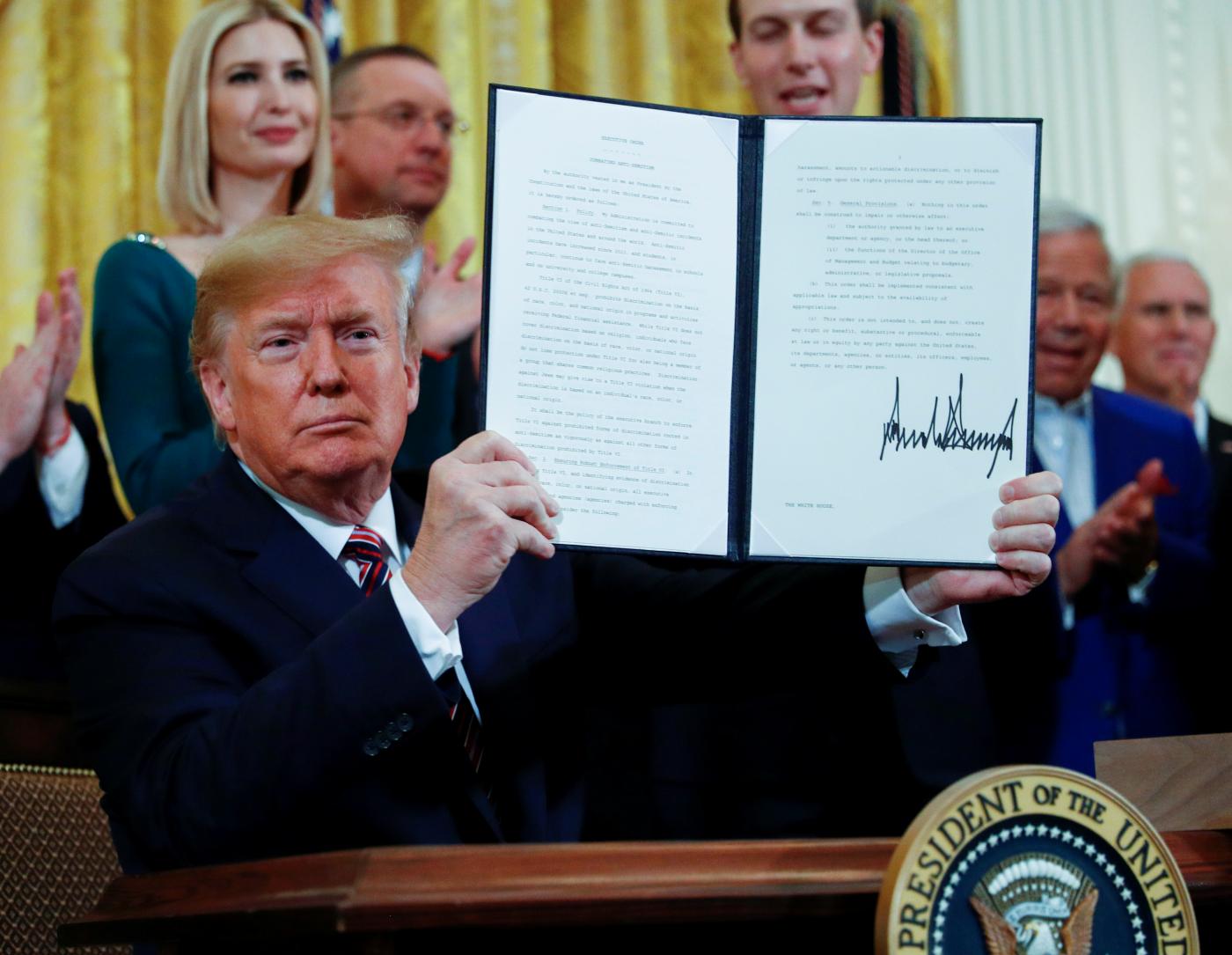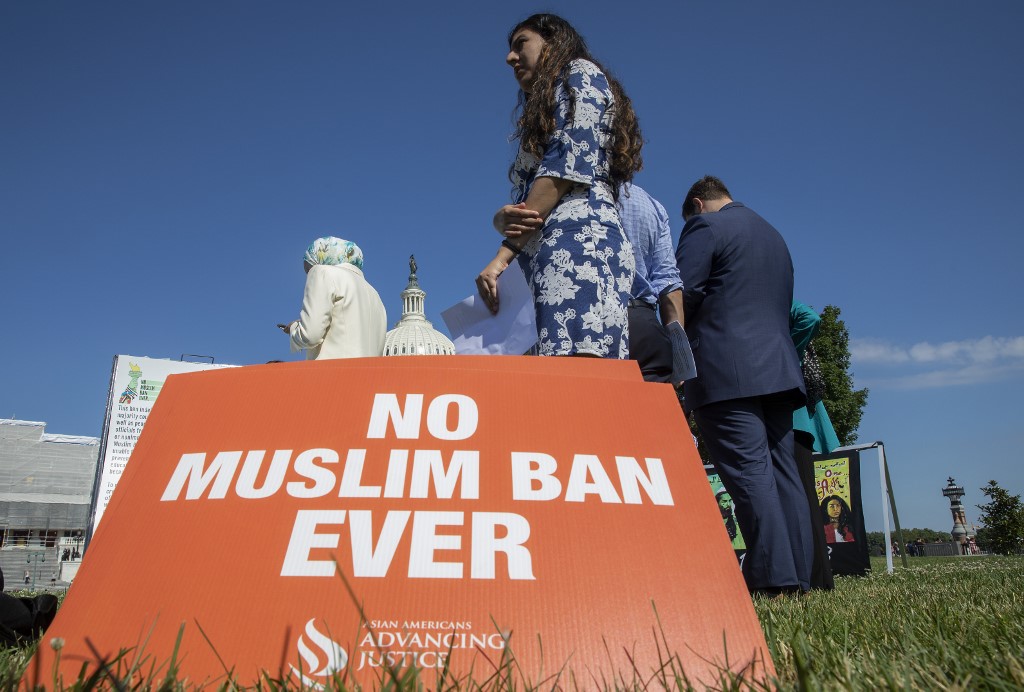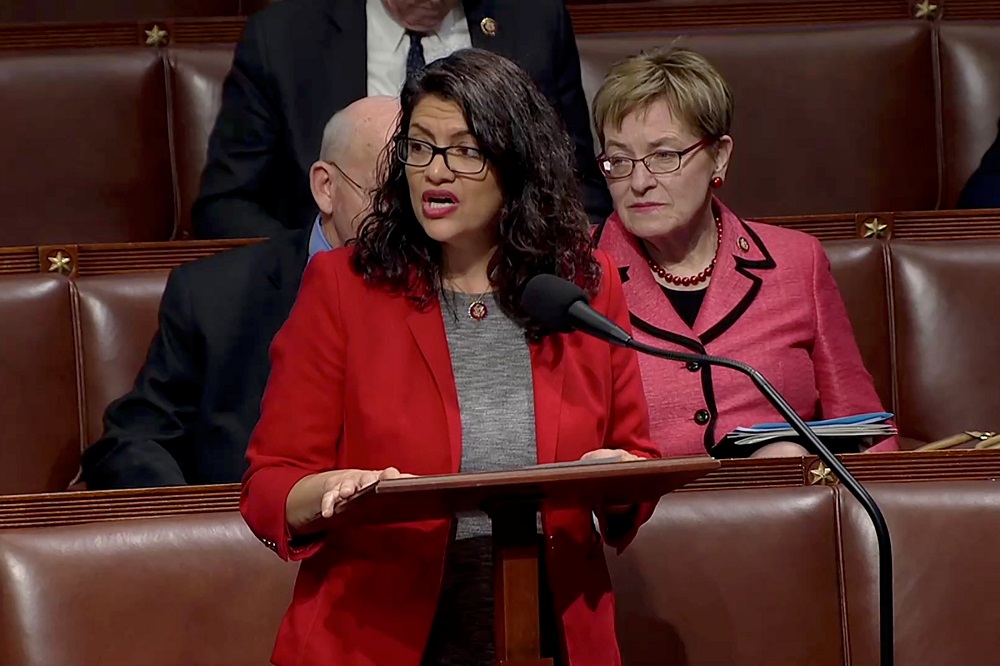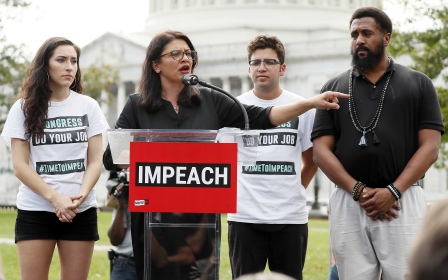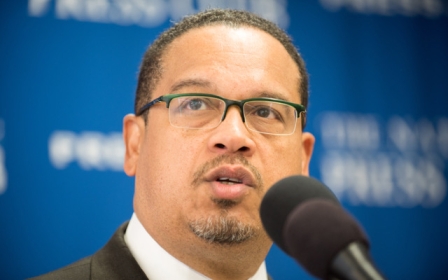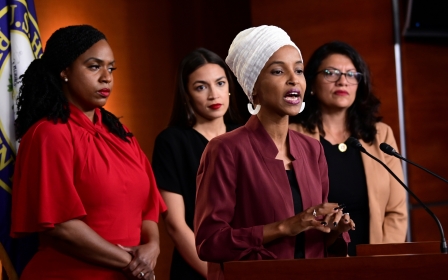Trump impeachment: Here's what Arab and Muslim Americans say about it
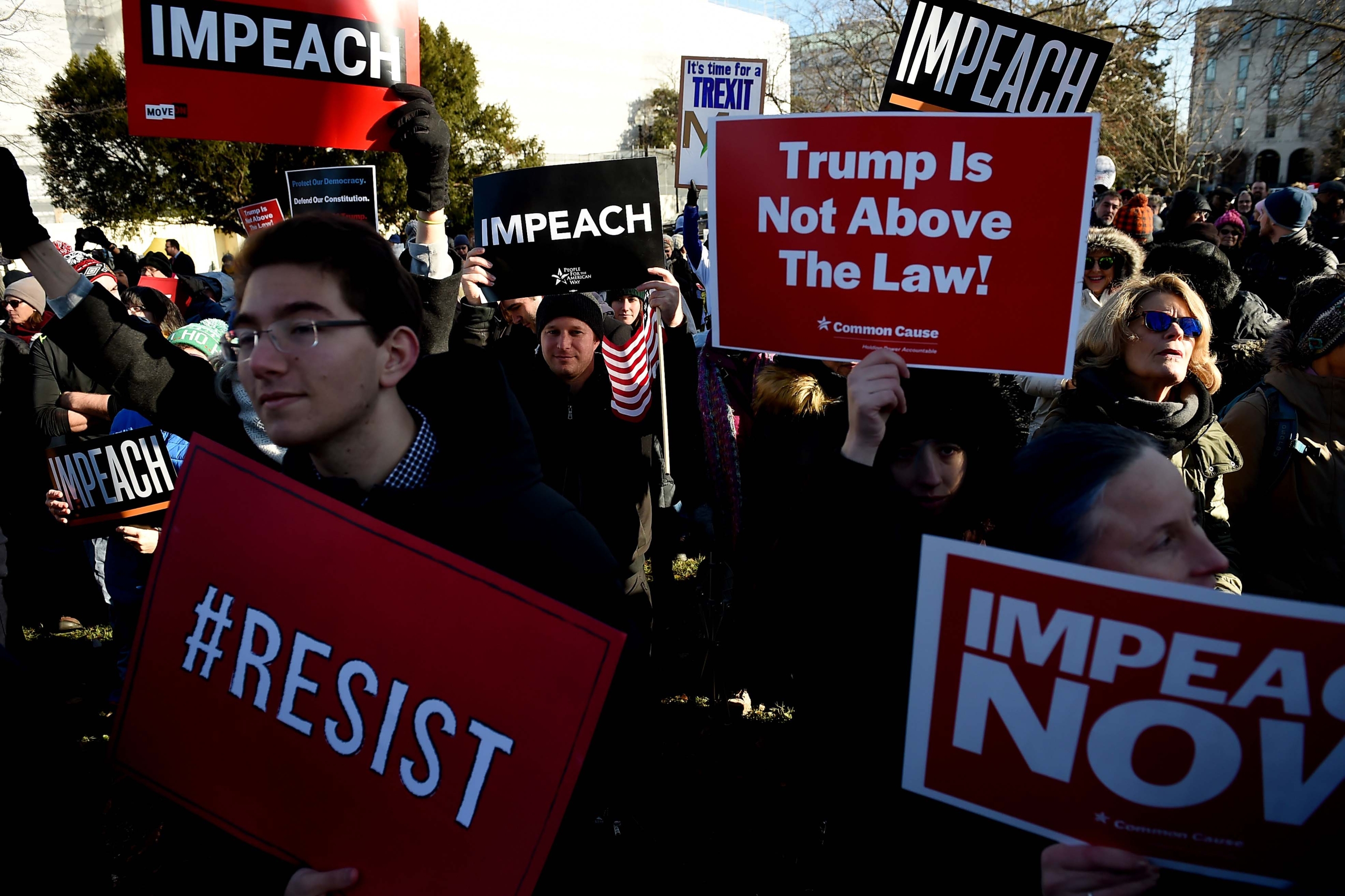
Candidate Donald Trump vowed to ban Muslims from coming into the United States. President Trump imposed a travel ban on several Muslim-majority countries within a week of taking the oath of office.
He has also implemented several policies that caused suffering and outrage across Arab and Muslim communities in the United States. Over the past three years, the US president has drastically reduced the number of refugees admitted into the country, recognised Jerusalem as the capital of Israel and signed an executive order that may threaten the right to Palestinian activism on American college campuses.
Still, Arab- and Muslim-American activists do not seem overly enthused about the impeachment proceedings in Congress against the 45th president of the United States.
With Trump's Republican Party standing firmly behind him, the chances of removing the president from office are close to zero.
The Democratic-controlled House of Representatives succeeded in impeaching Trump on Wednesday, making him the third president to ever be impeached. But impeachment, which the US Constitution grants solely to the House, is only half the process. Cutting a president's term short requires a conviction - by two-thirds of the votes - after a trial in the Senate.
As things stand, more than half of the senators in the Republican-controlled chamber vehemently reject the charges against Trump.
In fact, it's not even clear if Senate Republicans will allow witnesses to testify against the president.
House Democrats started the impeachment inquiry against Trump in September, following reports that he pressured Ukraine to investigate the son of his prospective 2020 rival, former Vice President Joe Biden. The administration had held up the aid to Ukraine, Democrats say, to get the Eastern European country's leaders to deliver a political favour to Trump.
The president was ultimately impeached on charges of abuse of power and obstructing Congress.
Supporters of the process say upholding the law is of vital importance even if it does not lead to ending Trump's presidency. Some critics argue that the impeachment has inflamed political tensions, and the best way to get Trump out of the White House is to defeat him in the 2020 elections.
MEE spoke to prominent Arab- and Muslim-Americans and gathered their thoughts on the situation. Here's what they said:
Abed Ayoub, civil rights lawyer: Impeachment could have 'devastating' outcome
Abed Ayoub, legal director of the American-Arab Anti-Discrimination Committee (ADC), said holding the president accountable is important, but in a hyper-partisan atmosphere, Trump may be able to use the process to rally his base and "gain momentum" ahead of next year's elections.
"This is the concern - what impact is this going to have? In practicality, it could have a devastating impact on our democracy," Ayoub told MEE.
While stressing that ADC is non-partisan and does not endorse candidates, Ayoub said Arab Americans should focus on the 2020 race.
"Arab Americans should put their eggs in the 2020 electoral basket - the 2020 elections. We need to pressure candidates to take positions on our issues. We need to ensure that they stand with us on important issues, and that they don't take our vote for granted. That's where we need to be pouring our energy. The impeachment process is just about over. We know how the Senate is going to respond. So we need to refocus and keep the pressure on the candidates going into the 2020 campaign."
Maya Berry, civic engagement advocate: Impeachment process painful but required
Maya Berry, executive director of the Arab American Institute (AAI), said the impeachment process is necessary to preserve American democracy. The erosion of the rule of law hinders Arab-American activists' efforts to promote the community's agenda - whether it's advocating human rights in Palestine or defending civil rights at home.
AAI pushes for Arab-American political engagement through its "Yalla Vote" campaign and other initiatives. Berry said as an advocate for participating in American democracy, she takes "no pleasure" in watching the impeachment proceedings.
"It's just painful to see this, but it's absolutely required," she told MEE.
Berry added that as activists prepare for 2020 to elevate Arab-American issues in the presidential race and ensure accurate counting by the census, they "don't have the privilege of overlooking" the president's abuses.
"It affects us when we live in a country with a broken democracy. It affects us like it affects every single other American who believes in separation of powers, who believes in our government institutions, who believes that an executive overreach of power should be checked by the legislative branch... If this abuse of power is allowed to go forward, it's not good for our country, and it's not good for our democracy."
George Bisharat, law professor: Trump should be impeached, but not for 'awful' policies
George Bisharat, a professor at the University of California Hastings College of the Law, said that the impeachment process is a good step to ensure that Washington does not normalise abuses of power. The result, however, will not have any real impact on Arab and Muslim Americans, as Trump will likely be acquitted by the Senate. While stressing that there is "more than sufficient" evidence to impeach Trump over the Ukraine scandal, the law professor said Trump's "awful" policies against Arabs and Muslims are not grounds for impeachment.
"Trump's policies have been awful for virtually all Muslims, for Arabs and particularly Palestinian Americans… As a Palestinian American, I will celebrate the end of the Trump administration however it comes about - whether through impeachment or through election defeat. But I, for one, would never advocate impeachment on policy grounds alone. It is simply not a tool meant for that purpose nor would having it succeed be a positive thing for the country because it would essentially say that impeachment is a tool which can be used to reverse elections."
Wardah Khalid, policy analyst: Impeachment will not solve our problems
Wardah Khalid, founder of Poligon Education Fund, an organisation working to amplify Muslim American voices in Congress, said the problems Muslims and Arabs are faced with in the US will not go away with Trump's impeachment.
Khalid said the president is a symptom of a larger problem. Policies negatively affecting Muslim communities predate his tenure in office. Still, she attributed the recent rise in hate crimes to the "political atmosphere Trump and other politicians" encourage.
"Politicians, pundits, and the media have long vilified Muslims and Arabs by conflating them with terrorism. Government policies preceding Trump violated civil liberties through the surveillance of our communities, airport profiling and "no-fly lists", and passage of anti-sharia legislation in dozens of states, threatening the fundamental right of Muslims to practice core tenets of their faith such as fasting, giving charity, and prayer…. In short, our community should view impeachment as a largely political process and not a means to seek justice for the particular problems we deal with in this country."
Amer Zahr, comedian: Arab Americans looking to 2020
Amer Zahr, a Palestinian-American comedian who teaches at the University of Detroit Mercy School of Law, said Trump's domestic and foreign policies that have proved harmful to Arab Americans are "far more important" than the current impeachment process, which is focused on Ukraine.
And that's why, he added, the community is more focused on the 2020 elections - which is a chance to actually remove Trump from office.
"Arab Americans, for the most part, are invested in the American political process and are becoming more active in electoral politics every day. I see that most Arab Americans recognise that Donald Trump has abused his office and his powers. But for us, his disastrous policy directives regarding immigration and foreign policy are far more important than the current impeachment process. As a result, we are getting very involved in the 2020 election cycle, making sure our voices are heard there."
Maysoon Zayid, comedian and writer: Trump needs to be held accountable
Maysoon Zayid, a comedian and writer who recently published an audiobook titled Find Another Dream, said she is "so incredibly proud" of Justin Amash and Rashida Tlaib - who are both of Palestinian descent.
Tlaib was amongst the first members of Congress to call for impeachment, and Amash, who quit the Republican Party in July, called for the president's impeachment in May over the Mueller report.
"I'm so proud to see these Arab Americans standing up against someone who really, truly reminds me of the worst tyrants and despots of the Middle East," Zayid told MEE.
Zayid said even though the articles of impeachment are about abuse of power and obstructing Congress, it would be "disgusting" if Trump's misogyny and racism go unpunished. She revelled in the prospect of impeachment, even if the Senate acquits the president.
"He absolutely has to be held accountable. Even though impeachment is just a 'scarlet I' stamp on him, even though it's just a stain on his presidency, it makes me so happy… He really has been dangerous for Palestinians; he's been dangerous for Arab Americans; and he's been dangerous, incredibly dangerous to the disabled community that I'm a part of."
Middle East Eye propose une couverture et une analyse indépendantes et incomparables du Moyen-Orient, de l’Afrique du Nord et d’autres régions du monde. Pour en savoir plus sur la reprise de ce contenu et les frais qui s’appliquent, veuillez remplir ce formulaire [en anglais]. Pour en savoir plus sur MEE, cliquez ici [en anglais].


